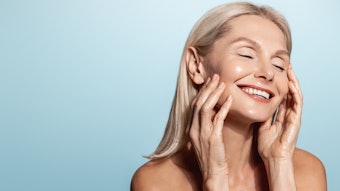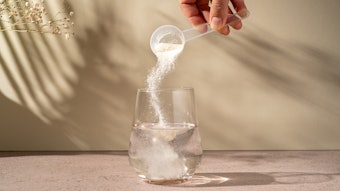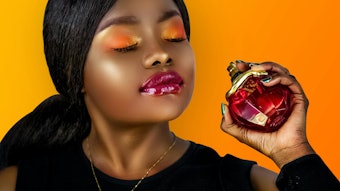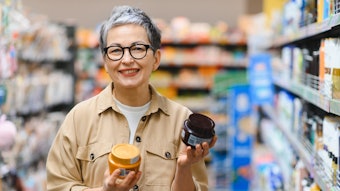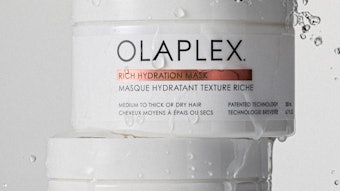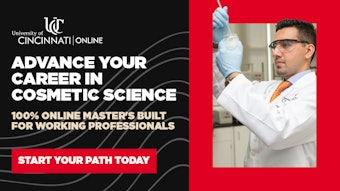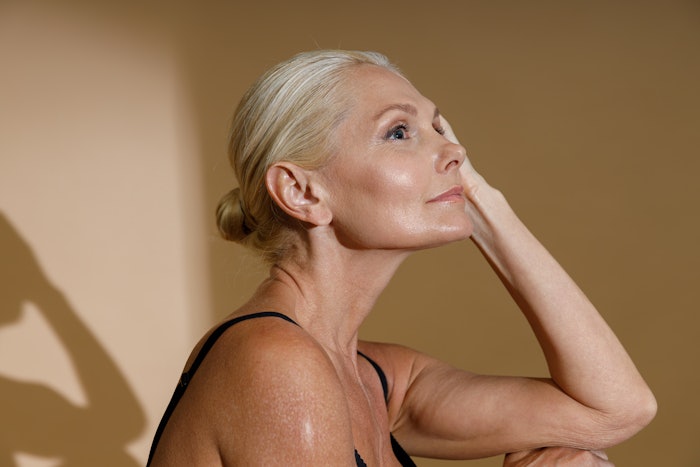
Hair wellness is everywhere, which has Global Cosmetic Industry asking: what’s next? Diving into consumer hair care search data, emerging ingredients with new and updated claims and functions, and a survey of recent brand launches, we've surfaced a wide array of opportunities. This includes white space in well-established and highly competitive categories as well as emerging issues that are still seeking dominant players. In this report, we’ll break down the most actionable trends and the innovation advancements and consumer sentiments driving them. Let’s get started.
Solving Hair Loss & Thinning Due to Stress, Hormones and More
Hair loss is a perennial shopper concern. According to July 2024 dataa from Spate, there are 1.3 million “hair growth” online queries each month in the United States alone. And a recent Cosmetify survey foundb that top online hair searches include “how to grow hair faster” and “why is my hair falling out.” At the same time, key causes of hair loss are increasingly being targeted by emerging ingredients and brands.
Tackling Stress-induced Hair Loss
For instance, Algaktiv recently launched the multifunctional Densidyl, which is designed to reduce stress-induced hair loss and recover hair color. The technology comprises xanthophyll and phycocyanin to block the cortisol receptors and repair oxidative damage. In effect, the ingredient reportedly fortifies hair follicles and encourages robust growth. Densidyl is recommended for use in supporting hair growth and density claims in conditioning and cleansing hair care products.
Ingestible Hair Loss Solutions
 Hum argues comparable products require as many as four daily pills, creating a challenge in encouraging shopper follow-through.Hum
Hum argues comparable products require as many as four daily pills, creating a challenge in encouraging shopper follow-through.Hum
“Consumers were telling us that the leading hair growth solutions that are drug free require too many pills per day,” says founder and CEO Walter Faulstroh. “Four to be precise."
He adds, “We wanted to change that by offering a groundbreaking one capsule per day formula that has been proven in a double blind placebo controlled study to improve hair growth and fullness. Results come fast and best of all at 1/3 of the price.”
The Hair Strong Capsule's ingredients include botin for hair, skin and nail health; folic acid to encourage keratin production; B12 for red blood cell creation and oxygen distribution to hair follicles for growth stimulation; zinc for follicle health and reduced shedding; fo-ti (Polygonum multiflorum) to support hair growth and color; and PABA for hair fall prevention and encouragement of healthy growth.
![Ingestible hair care supplements have immense potential, says Jason Harcup, chief R&D officer for Unilever’s Beauty and Well-being division: “Nutrafol, one of our recent acquisitions that sits within our Health & Well-being business, pioneered the hair wellness category in the U.S. [market] and is built on a rigorous science-backed approach to hair health.'](https://img.gcimagazine.com/files/base/allured/all/image/2024/07/Nutrafol_Womens_Hair_Growth_Nutraceutical_Range.63c6e6b823940.66a81a5aed43c.png?auto=format%2Ccompress&fit=max&q=70&w=400) Ingestible hair care supplements have immense potential, says Jason Harcup, chief R&D officer for Unilever’s Beauty and Well-being division: “Nutrafol, one of our recent acquisitions that sits within our Health & Well-being business, pioneered the hair wellness category in the U.S. [market] and is built on a rigorous science-backed approach to hair health."Nutrafol
Ingestible hair care supplements have immense potential, says Jason Harcup, chief R&D officer for Unilever’s Beauty and Well-being division: “Nutrafol, one of our recent acquisitions that sits within our Health & Well-being business, pioneered the hair wellness category in the U.S. [market] and is built on a rigorous science-backed approach to hair health."Nutrafol
Harcup notes, “What sets Nutrafol apart is their focus on science, technology and evidence generation. They prioritize putting their hair health innovations to the test and have a robust set of clinical studies to support their brand promise of supporting people on their hair health journey and improve hair growth with three to six months of use.”
The brand isn’t stopping at supplements, however. Harcup explains, “In addition to ingestibles, Nutrafol promotes the holistic integration of topical products to enhance overall effectiveness. While topical products have long been the go-to for addressing hair health externally, there’s a growing recognition of the importance of nourishing hair from within.”
Hormonal Hair Loss: an Emerging Target
 Per Spate, “hormonal hair loss” is one of the fastest-growing consumer hair searches online. Related searches include “how to stop hormonal hair loss,” “can hormonal hair loss be reversed” and “what treatments are available?”New Africa at Adobe Stock
Per Spate, “hormonal hair loss” is one of the fastest-growing consumer hair searches online. Related searches include “how to stop hormonal hair loss,” “can hormonal hair loss be reversed” and “what treatments are available?”New Africa at Adobe Stock
Recent Spate data backs up Faulstroh’s observations about postpartum and perimenopausal concerns; per the firm, “hormonal hair loss” is one of the fastest-growing consumer hair searches online. Related searches include “how to stop hormonal hair loss,” “can hormonal hair loss be reversed” and “what treatments are available?”
“As we get older, there are biological changes that begin to happen to our hair,” says Michelle Chavez, vice president of innovation, Accupac/Cobalt Labs. “The scalp gets dehydrated faster, oil glands slow down sebum production and the skin has trouble holding on to moisture, leading to thinner, flatter skin on the scalp. Simultaneously, the length of the hair growth cycle gets shorter, and the follicle diameter gets smaller, resulting in hair thinning and loss.”
Chavez adds, “Much of this is worsened by the hormonal changes during perimenopause, typically between the ages of 45-55, which can have severe effects to the scalp including a dramatic decline in collagen production.”
A June 2024 Euromonitor reportc backs up these observations: “The past decade has seen a push among female consumers to better understand how hormonal changes during life stages impact their skin and hair. The industry is in an exploratory stage to identify scientifically proven claims that address need states by life stages, and to invest in consumer education regarding functional benefits for women.”
Boosting Hair Volume & Strength
On the ingredient front, Provital’s Densinaria, derived from Palmaria palmata seaweed, addresses hair volume and strength concerns in a single technology.
“Densinaria … is an active ingredient enhanced with arginine, 100% natural in origin and COSMOS-approved, that addresses hair fiber resistance and split ends prevention, enabling ... a healthy and volumized mane for longer," says Nina Esposito, area sales and marketing director, Provital.
The technology, rich in reconstructing biomolecules such as proteins and peptides, reportedly restores the hair from the cortex to the cuticle via functionality that is similar to keratin.
Per Esposito, “The appearance of split ends is more than halved, hair’s resistance to breakage more than triples and hair fiber diameter increases by 25% [when Densinaria is applied]. It can be used in keratin-like hair solutions to strengthen the hair fiber or when hair is weakened by hormonal and stress factors.”
New Hair Care Ingredients Are Doing Damage Control
 Recently, upstart hair wellness brand Lobie highlighted its Lobie Peptide, which comprises 123 amino acids to support polypeptide chains and disulfide bonds damaged by bleaching, coloring, chemical treatments and heat styling.Lobie
Recently, upstart hair wellness brand Lobie highlighted its Lobie Peptide, which comprises 123 amino acids to support polypeptide chains and disulfide bonds damaged by bleaching, coloring, chemical treatments and heat styling.Lobie
Recently, upstart hair wellness brand Lobie highlighted its Lobie Peptide, which comprises 123 amino acids to support polypeptide chains and disulfide bonds damaged by bleaching, coloring, chemical treatments and heat styling.
When interacting with the keratin structure of the hair, the Lobie Peptide is claimed to reconnect damaged sites at the molecular level.
“Biotech ingredients enable us to create highly effective formulations that target specific hair care needs,” says Lobie founder and CEO Anastasia MacKay. “For example, we can develop peptides and proteins that precisely address issues like damage repair, moisture retention and frizz reduction. This scientific precision ensures that our products deliver real, noticeable results.”
Reducing Hair Damage: New Technologies
Among recent damage-focused hair care ingredients is Sharon Personal Care's 100% natural Sharofeel DS (INCI: dioctyldodecyl succinate) emollient, which reportedly delivers skin- and hair-enhancing benefits in beauty formulations. In hair care, Sharofeel DS has significant thermal stability for heat protection in hair styling and other hair care applications.
Meanwhile, Provital’s new rosehip-inspired multifunctional Sealrose (INCI: Helianthus annuus (sunflower) seed oil (and) Rosa canina fruit extract (and) tocopherol) can reportedly reduce hair damage by 72% after just one application by boosting hydrophobicity.
Sealrose remains after rinse-off, with a 65% recovery, per the company. In addition, combability is boosted by 33% and softness by 17%. The result is softer and more hydrated and manageable hair.
The technology is reportedly appropriate for formulations designed to repair hair cuticle damage.
 Sealrose remains after rinse-off, with a 65% recovery, per the company.Pixel-Shot at Adobe Stock
Sealrose remains after rinse-off, with a 65% recovery, per the company.Pixel-Shot at Adobe Stock
“The lipid layer plays a pivotal role in ensuring optimal hair wellness through multiple mechanisms,” explains Provital’s Esposito. “Firstly, it acts as a natural barrier that helps to retain moisture within the hair shaft, thereby preventing dryness and brittleness. This moisture retention not only keeps the hair hydrated but also enhances its elasticity and flexibility, reducing the likelihood of breakage and split ends.”
She continues, “Additionally, the lipid layer contributes to the smoothness and shine of hair by forming a protective coating that reflects light, resulting in a healthier and more vibrant appearance. Moreover, this protective barrier shields the hair from external aggressors such as UV radiation, pollutants and chemical treatments, which can otherwise cause damage and weaken the hair structure.”
Esposito concludes, “By maintaining the integrity of the lipid layer, hair becomes more resilient to environmental stressors and easier to manage, ultimately supporting overall hair health and longevity. Therefore, focusing on maintaining or restoring the lipid balance in hair care products is essential for promoting optimal hair condition and enhancing its natural beauty.”
Boosting Hair Resilience
Sharon Personal Care's SharoHyal Moringa hair restoration technology comprises medium molecular weight hyaluronic acid and hydrolyzed moringa micro-proteins that reportedly boost hair elasticity and resilience by 6% after seven treatments and moisturization by 45% after one treatment (per clinical tests).
The ingredient, which purportedly has a more pleasant odor profile compared to other common proteins, takes inspiration from the skinification of hair care.
Per Sharon Personal Care, the chemical bonds created between the negative charges of SharoHyal Moringa’s hyaluronic acid content and the positive charges of the hydrolyzed proteins within this vegetal protein help form a protective layer on the cuticle.
This layer rebuilds damaged hair strands.
“With SharoHyal Moringa you can create a superior formulation,” says Robert Donadelli, R&D manager at Sharon Personal Care. “It is natural, water-soluble, and it offers improved color and odor when compared to common proteins, making it highly appealing for clean beauty. This protein is sustainably sourced, produced through an eco-conscious extraction process, and it is biodegradable. By incorporating SharoHyal Moringa, companies can demonstrate their commitment to sustainable hair care benefits and innovation.”
A Conditioning Polymer for More Resilient Hair
Elsewhere, Syensqo’s Naternal Care Clear SGI (guar hydroxypropyltrimonium chloride) is reportedly the first readily biodegradable, non-ecotoxic and ethically sourced conditioning polymer for hair experiencing low to medium damage. The ingredient is applicable in ultra-clear formulas and offers conditioning with no build-up, per Syensqo, allowing it to perform well in both wet and dry stages. Notably, Naternal Care Clear SGI can be used to replace polyquaterniums in formulations designed for even fine and baby hair.
Hair Styling Defense
Damage prevention has also been a critical focus, especially in the context of styling.
 “There has been a continuous trend toward style and self-expression, particularly post-pandemic,” says Unilever’s Harcup. “We are seeing a trend toward at-home styling, partially driven by advancements in hot tools that deliver at home. This can bring damage and so consumers are ensuring they can protect their hair health while expressing themselves authentically.”Ljupco Smokovski at Adobe Stock
“There has been a continuous trend toward style and self-expression, particularly post-pandemic,” says Unilever’s Harcup. “We are seeing a trend toward at-home styling, partially driven by advancements in hot tools that deliver at home. This can bring damage and so consumers are ensuring they can protect their hair health while expressing themselves authentically.”Ljupco Smokovski at Adobe Stock
Harcup notes, “Unilever brands are pioneers in this space. TRESemmé, the number 1 styling brand in the United States, offers a product with an impressive protection up to 450°F, and is the No.1 selling heat protecting spray in the U.S. [market].”
He concludes, “We also have multi-benefit products that help during the styling process with anti-frizz, smooth, shine and heat protect all in one. Our latest launch, the Nexxus Prep & Protect Heat Protect Spray, offers 72 hours humidity shield and 48 hours frizz control and contains our StyleProtect Technology to help consumers achieve salon-quality looks while prioritizing their hair health.”
Styling defense is the focus of Ashland’s N-Durhance ES-Repair ingredient (INCI: hydroxypropyl guar hydroxypropyltrimonium chloride (and) guar hydroxypropyltrimonium chloride). The split end repair polymer reportedly protects hair from damage and breakage during wet combing and heat styling. It also provides a lubricated, non- tacky feel when wet and feels well-conditioned when dry, per the company.
HairMimics Boost (ceramide NG (and) cholesterol (and) palmitic acid (and) Macadamia integrifolia seed oil (and) Ricinus communis (castor) seed oil (and) Olea europaea (olive) fruit oil) from Evonik, meanwhile, protects the hair from damage induced by UV exposure, grooming and linear aging.
In hair care formulations, the technology reportedly replenishes lost essential lipids to prevent brittleness and resulting damage. The oil-based ceramide ingredient mimics the essential lipids in hair to enhance mechanical resistance and improve the appearance of damaged hair tips.
Textured Hair Remains Underserved
Beauty ingredient suppliers and brands have long spoken about the needs of consumers with textured hair. Yet, search data shows many shoppers have yet to find the ideal solution. Per July 2024 Spate data, there are 5.5 million online curly hair searches in the U.S. market every month.
These concerns are central to Unilever’s polycultural hair innovation agenda.
 “An estimated 65% of the US population have curly, coily or wavy hair, according to a 2018 Texture Trends Report from Texture Media,” say Andrew Miller, senior marketing manager, hair, body and oral care, North America, Gina Koustoubardis, technical service specialist, personal care North America, and Mythili Nori, senior scientist, performance and claims, personal care North America, BASF. “With a growing focus on inclusivity and diversity, there has been a surge in demand for hair care products and services that cater specifically to textured hair types. This shift in consumer behavior has led to a flourishing industry that celebrates and embraces the unique needs and beauty of textured hair.”(JLco) Julia Amaral at Adobe Stock
“An estimated 65% of the US population have curly, coily or wavy hair, according to a 2018 Texture Trends Report from Texture Media,” say Andrew Miller, senior marketing manager, hair, body and oral care, North America, Gina Koustoubardis, technical service specialist, personal care North America, and Mythili Nori, senior scientist, performance and claims, personal care North America, BASF. “With a growing focus on inclusivity and diversity, there has been a surge in demand for hair care products and services that cater specifically to textured hair types. This shift in consumer behavior has led to a flourishing industry that celebrates and embraces the unique needs and beauty of textured hair.”(JLco) Julia Amaral at Adobe Stock
He adds, “We’re also working to fill gaps in knowledge about polycultural consumers (across the industry, just 5% of trials include people from African American and Hispanic backgrounds) and we are committed to increasing our partnerships with diverse experts and suppliers, specifically Black- and Brown-owned suppliers and manufacturers.”
“An estimated 65% of the US population have curly, coily or wavy hair, according to a 2018 Texture Trends Report from Texture Media,” say Andrew Miller, senior marketing manager, hair, body and oral care, North America, Gina Koustoubardis, technical service specialist, personal care North America, and Mythili Nori, senior scientist, performance and claims, personal care North America, BASF. “With a growing focus on inclusivity and diversity, there has been a surge in demand for hair care products and services that cater specifically to textured hair types. This shift in consumer behavior has led to a flourishing industry that celebrates and embraces the unique needs and beauty of textured hair.”
The BASF team adds, “One of the key factors driving the growth of textured hair care in North America is the increasing awareness and acceptance of natural hair. Many individuals, particularly those with curly, coily or tightly coiled hair, have chosen to embrace their natural hair texture instead of chemically straightening or altering it. This has created a demand for products that enhance and maintain the health and vitality of textured hair.”
This has led to a launch of products such as shampoos, conditioners, styling gels and treatments featuring ingredients such as shea butter, coconut oil and argan oil.
“However,” the BASF group notes, “despite the progress, challenges remain in the textured hair care industry. There is still a significant gap in the market for products that cater to protective hairstyles. This presents an opportunity for growth in the market as there is high consumer demand and buy in for protective hairstyle products.”
Key opportunities include a focus on hair health, styling products for textured hair, dry and itchy scalp care, and solutions for protective styles. Top concerns in need of solving include dryness (an opportunity for masks), breakage and detangling, per the BASF group.
On the styling front, the BASF team has some insights: “Throughout the process of washing, conditioning and styling curly and coily hair, there are various phases of transformation. When wet and freshly styled, curls tend to naturally stretch and hang lower. However, as they gradually dry, their pattern tightens, causing each curl to spring up and coil. This phenomenon, often referred to as ‘shrinkage,’ is the reason why curly hair can sometimes appear shorter than its actual length.”
Among the BASF ingredient solutions designed to meet the needs of textured haired consumers are:
- PeptAIde 4.0, comprising four multifunctional peptides, derived from organic rice proteins. The technology reportedly has a soothing effect on sensitive scalps, thereby reducing scalp scales and redness. In addition, it helps to normalize scalp pH. Furthermore, it supports hair follicle vitality by protecting against hair collagen degradation. The result is greater hair volume.
- Rambuvital, an extract of rambutan seeds that reportedly helps vitalize and protect the scalp and hair follicles against pollution, while minimizing malodor and energizing the hair bulb. The technology is ideal for protective styles, delivering moisture and freshness.
- Cetiol Softfeel and Cetiol C5, emollients that act as alternatives to petrolatum and silicones and which work together to provide hydration to the hair and scalp, leaving it feeling silky smooth and soft to the touch.
- Cegesoft PS 6 and Cegesoft SB 45 TR, emollients that work to hydrate and enhance the texture of curly and coily hair for improved smoothness and manageability, per BASF.
- Verdessence Alginate and Verdessence Xanthan, biopolymers that act as both rheology modifiers/product texture enhancers and natural styling polymers to create serums with light, gel-like consistencies. They also provide long-lasting styling benefits like frizz management.
New Frontiers in Scalp Wellness
In Q1 2024, Circana reported that skin-care-inspired hair care products such as oils, serums and scalp care all grew between 13% and 25% in the U.S. marketd.
The Interconnectedness of Scalp & Hair Health
The trend in scalp care intersects with concerns surrounding hormonal changes during different life stages, textured hair and hair loss/fall (as discussed previously in this report).
![“Dove’s Scalp + Hair Therapy collection is a new premium range of products in the U.S. [market], co-created with dermatologists that nourish and strengthen hair from root to tip,” explains Harcup. “The new range uses ingredients more commonly seen in skin care, such as niacinamide, peptides and zinc, to enhance scalp health and promote fuller, stronger hair.”](https://img.gcimagazine.com/files/base/allured/all/image/2024/07/Dove_Hair_Care_Therapy_Collection.66a8fec6a2ba7.png?auto=format%2Ccompress&fit=max&q=70&w=400) “Dove’s Scalp + Hair Therapy collection is a new premium range of products in the U.S. [market], co-created with dermatologists that nourish and strengthen hair from root to tip,” explains Harcup. “The new range uses ingredients more commonly seen in skin care, such as niacinamide, peptides and zinc, to enhance scalp health and promote fuller, stronger hair.”Dove/Unilever
“Dove’s Scalp + Hair Therapy collection is a new premium range of products in the U.S. [market], co-created with dermatologists that nourish and strengthen hair from root to tip,” explains Harcup. “The new range uses ingredients more commonly seen in skin care, such as niacinamide, peptides and zinc, to enhance scalp health and promote fuller, stronger hair.”Dove/Unilever
Harcup notes, “These products promote follicle vitality via increasing follicle cell turnover and improving hair anchorage. In multiple studies, the Clear Anti Hair Fall range can reduce hair loss and improve hair density within four weeks. In consumer tests, 90% perceived a significant reduction in hair loss within two weeks.”
This is just the beginning, Harcup says: “Skin care has benefitted so much from scientific advances in recent years, so clearly a huge new playground has opened up from that for hair, starting with the scalp. The rise of ‘skinified’ hair care routines reflect a market shift toward maintaining and enhancing hair vitality with the same scientific rigor and holistic approach as skin care. What’s more, in our era of unlimited access to information, consumers are so much more educated on the latest in science, efficacious ingredients and formats, and this is driving their eagerness to use these new approaches.”
These innovations are already hitting the market.
“Dove’s Scalp + Hair Therapy collection is a new premium range of products in the U.S. [market], co-created with dermatologists that nourish and strengthen hair from root to tip,” explains Harcup. “The new range uses ingredients more commonly seen in skin care, such as niacinamide, peptides and zinc, to enhance scalp health and promote fuller, stronger hair.”
Multi-benefit Scalp Care
“Scalp care is incredibly important as we age because it is directly linked to the health of the hair follicles, and we know that the skin on the scalp ages faster than the skin on the face and body,” says Cobalt Labs’ Chavez. “Scalp care products should provide nutrition, support circulation, provide hydration, strengthen the barrier and keep the microbiome in balance.”
She adds, “At Cobalt Labs, we are predicting a rise in multi-benefit styling treatments that also provide scalp skin care. Our Root Lifting, Energizing and Volumizing Spray is a plumping treatment that builds fullness, body and texture by fortifying roots and densifying hair while also caring for the skin on the scalp. This refreshing scalp spray stimulates and strengthens follicles without weighing down hair. The non-greasy formula helps support a healthy environment for hair to grow while providing soft-touch, long lasting volume.”
Scalp Care Ingredients
On the ingredient front, Provital’s Kerascalp offers solutions particularly for older consumers.
“Kerascalp … effectively mitigates hair thinning and loss by promoting hair thickness and preventing follicle miniaturization and weakening,” says Provital’s Esposito, “while preserving the stem cell niche for follicle strength and improving hair anchorage to the scalp. To combat slow hair growth associated with aging, Kerascalp stimulates and supports the hair growth cycle, enhancing volume and density for a fuller appearance.”
 “Kerascalp … effectively mitigates hair thinning and loss by promoting hair thickness and preventing follicle miniaturization and weakening,” says Provital’s Esposito, “while preserving the stem cell niche for follicle strength and improving hair anchorage to the scalp. To combat slow hair growth associated with aging, Kerascalp stimulates and supports the hair growth cycle, enhancing volume and density for a fuller appearance.”Pixel-Shot at Adobe Stock
“Kerascalp … effectively mitigates hair thinning and loss by promoting hair thickness and preventing follicle miniaturization and weakening,” says Provital’s Esposito, “while preserving the stem cell niche for follicle strength and improving hair anchorage to the scalp. To combat slow hair growth associated with aging, Kerascalp stimulates and supports the hair growth cycle, enhancing volume and density for a fuller appearance.”Pixel-Shot at Adobe Stock
Esposito explains why collagen XVII is so critical to hair wellness.
“Collagen XVII is a key protein essential for maintaining strong and healthy hair follicles,” she says. “It forms structures called hemidesmosomes that anchor the outer skin layer (epidermis) to the deeper layers (dermis), providing crucial stability to hair follicles. Beyond structural support, collagen XVII plays a pivotal role in regulating the hair growth cycle, ensuring proper transitions between growth phases, and supporting continuous hair regeneration. It also contributes to maintaining the stem cell niche within hair follicles, crucial for the production of new hair cells.”
Esposito adds, “Collagen XVII is not only important for the structural integrity and regeneration of hair follicles but also plays a significant role in the pigmentation of hair. Collagen XVII supports hair pigmentation by maintaining the environment necessary for melanocyte function, ensuring effective melanin transfer, preserving the melanocyte stem cell niche and protecting against aging-related damage. These roles are crucial for maintaining healthy, pigmented hair and preventing premature graying.”
Finally, says Esposito, “Kerascalp is prominently featured across scalp and hair care for its diverse benefits. It’s celebrated for promoting a youthful appearance, serving as an all-in-one hair care solution, and combating hair loss and premature graying. With its ability to enhance hair shine, vitality, and strength, Kerascalp is truly versatile. It finds application in scalp treatments, beauty and anti-stress regimens, well-aging and preventative care, all while being vegan and 100% natural from the amla fruit. From leave-on serums to hair masks and mists, Kerascalp is considered indispensable in leave-on hair care products.”
Scalp Care for Textured Hair
Elsewhere, Croda Beauty Actives has unveiled new tests highlighting Apiscalp's scalp hydrating and flaking reduction effects on individuals with textured hair. The multifunctional active comprises a natural extract of Apium graveolens (celery) seeds obtained via a supercritical CO2 extraction process.
It complies with Chinese cosmetics regulations and is COSMOS-approved. Apiscalp reportedly addresses:
- oily and dry scalps to combat dandruff, itching, dryness and hyperseborrhea;
- local microflora (Malassezia) proliferation associated with itchy and flaking scalps;
- the restoration of the scalp stratum corneum integrity for an improved skin barrier;
- and regulation of epidermal differentiation and desquamation.
Per the latest research, Apiscalp reduces scalp itching by 80% among those test subjects with textured hair. It also improves scalp hydration by 43% after 3 weeks’ application.
Study volunteers reported an improvement in the flaking state of their scalp in as little as one application, per Croda Beauty Actives, with an average reduction of 19%. After 3 weeks, this reduction grew to 63%, regardless of gender or hair type.
“More in vivo and in vitro studies, available on demand, have been conducted to demonstrate its various benefits on scalp beauty and wellness,” per the company.
Promoting Hair Growth from the Scalp Up
Sabinsa’s Proscalpin is a solvent-free blend comprising Cococin (Cocos nucifera (coconut) liquid endosperm), Saberry (Emblica officinalis fruit extract) and PeptiSeLect (γ-L-glutamyl-L-selenomethionine (GGLSM)) that promotes hair growth by enhancing the proliferation of human follicle dermal papilla cells (HFDPC) and protecting against UV stress.
Preserving the Scalp Microbiome
Lubrizol Life Science Beauty has released tests for Fensebiome peptide (INCI: water (aqua) (and) acetyl heptapeptide-4 (and) caprylyl glycol) applied to the scalp.
The data reportedly showed an increase in beneficial scalp microbiota that tends to decrease with age and a modulation of age-induced microbiota changes associated with a rejuvenated and healthier scalp.
The ingredient was also tested on two panels of volunteers: a group of women with sensitive scalps and a group of men with bald sensitive scalps. Both groups found that the ingredient soothed the scalp, leaving it feeling hydrated and with less itchiness and desquamation, per the company.
In vitro tests also showed a reduction of kallicrein-5 and PAR-2 activation, which helps relieve inflammatory and itching skin and scalp conditions.
Previously, the ingredient was shown to have effects on the skin by reinforcing the double cutaneous barrier, promoting microbiota balance and enhancing the physical barrier, helping to achieve a healthier and younger appearance, per the company.
The heptapeptide can now be incorporated into scalp formulations designed to reduce sensitivity, prevent dehydration and rejuvenate the scalp as well as form part of skin care products aiming to strengthen the double cutaneous barrier, per the company.
Emerging Hair Care Ingredients Target Category Concerns
Croda's Crodamol GTS (INCI: C10-14 alkyl polypropanediol-3 myristate) vegetable-derived emollient reportedly imparts significant smoothness and shine across multiple hair types.
The ingredient technology is intended for shampoos, rinse-off and leave-in conditioners, treatments, hair styling, hair color, skin care, body care, and color cosmetics.
This technology boasts an eco-friendly profile, offering biodegradability and low aqua toxicity, while also being vegan suitable and 100% natural.
At Suppliers' Day 2024, Croda featured the technology in an anti-humidity mango and avocado hair-finishing butter.
The formulation was designed to offer nourishment and styling in a single product.
‘Clean’ Hair Wellness Ingredients
While efficacy is at the forefront of today’s beauty world, eclipsing vague “clean” claims, there is still strong demand for alternatives to conventional chemistries. For instance, Syensqo recently launched Dermalcare Avolia MB (isoamyl laurate, Persea gratissima oil), a replacement for non-volatile silicone oils in hair care. The technology is said to be a sensory booster with strong performance in wet and dry combing.
Meanwhile, Croda’s Crodamol GTS (INCI: C10-14 alkyl polypropanediol-3 myristate) is a vegetable-derived emollient that reportedly imparts significant smoothness and shine across multiple hair types. The ingredient technology is intended for shampoos, rinse-off and leave-in conditioners, treatments, hair styling, hair color, skin care, body care and color cosmetics. This technology boasts an eco-friendly profile, offering biodegradability and low aqua toxicity, while also being vegan-suitable and 100% natural.
FOOTNOTE
awww.spate.nyc
bwww.cosmetify.com/us/the-hair-report
cwww.euromonitor.com/top-trends-shaping-the-beauty-and-personal-care-industry/report
dwww.circana.com/intelligence/category/blog/

